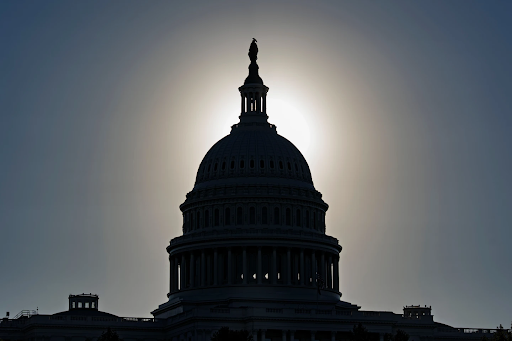O Say Can You See a New National Anthem?
“The Star Spangled Banner” is in dire need of replacement.
April 21, 2023
When one thinks of a national anthem, it’s reasonable to expect a song that represents the values of those who proudly sing it. In America, though, that is not the case. For as long as anyone can remember, “The Star Spangled Banner” has been the song played at sporting events, military functions, and in patriotic displays; contrary to its use, however, it could be a lot better. Replacing this song is vital to ensuring that the United States stays true to its founding principles in the modern day.
“The Star Spangled Banner” was originally a poem by American lawyer Francis Scott Key, according to the Smithsonian Magazine. Written in 1814 while America was embroiled in the War of 1812 against Great Britain, the now-song displays the Battle of Baltimore and bombardment of Fort McHenry. At the time of the battle, Key was a temporary detainee of the British being held to prevent military secrets about the battle from being divulged. Although the assault was intense, the Americans remained in control of the fort by morning, winning the battle. The poem, started while Key was still being held, captures the triumph of American resistance and the glory of the flag, which made it popular throughout 19th and 20th century America. According to Britannica, the United States made the song the national anthem in 1931.
Although the poem itself is certainly well-written and deserving of literary recognition, hailing it as the national anthem is a mistake. Firstly, singing it is quite difficult. The train of thought of the first stanza is begun with a massive, sprawling, confusing run-on sentence. Of course, such is the nature of poetry, but comprehending it is made exceedingly difficult by the fact that the action being performed by the item with broad stripes and bright stars comes at the very end of the sentence. For four lines, the reader struggles to determine exactly what the poem is describing. It is this lengthy segment that makes the anthem so difficult to memorize; anthems ought to be succinct and clear enough to be easily known and sung. The rest of the poem is better, but it brings up another problem: without an understanding of the historical situation of the poem, “O say can you see” and “O say does that star-spangled banner yet wave / O’er the land of the free and the home of the brave?” sounds eerily similar to questioning whether the flag still flies over the same country as when Key wrote it. Although that has political connotations, including such a loaded discussion in a national anthem is worrying. Furthermore, the only part of the song that meaningfully addresses American principles is “O’er the land of the free and the home of the brave?” which is not particularly insightful into what it really means to be an American.
With a national anthem as poor as “The Star Spangled Banner,” replacement is obvious. How to do so is less obvious, though. There is a great deal of music and poetry, both old and more contemporary, about America that could potentially work as a national anthem. To find a strong substitute, it is necessary to look at four factors: national meaning, strong and easily understood writing, good music or the ability to be set to music, and mainstream popularity in American culture. The piece that most amply meets these conditions is most deserving of the coveted role in American life.
My first instinct is to examine “America the Beautiful.” This song is relatively brief lyrically (much like “The Star Spangled Banner,” though, it has more stanzas than are traditionally sung) and is a mainstream “patriotic” song. The piece examines what makes America beautiful, beginning with its natural environment in such a way that intrinsically promotes conservationism. The song then extends that to the fraternity of Americans “from sea to shining sea,” providing a uniting vision for a diverse and varied population. Combined with the soaring vistas imagined at the beginning, this provides a strong national meaning to the song that would validate it as the national anthem. “America the Beautiful” isn’t perfect though — for one, those “amber waves of grain” were only secured by a legacy of American imperialism and abuse of indigenous peoples, and the song offers little reconciliation for that. Additionally, the line “God shed His grace on thee,” could be seen as too religious for a government wishing to claim separation of church and state; even if it’s deemed a metaphor, that could be enough to prevent the song’s acceptance.
The best choice for a new national anthem comes from a song that is already well-known in some circles. Americans already hear it at the Superbowl. Often referred to as the Black national anthem, according to CNN, “Lift Every Voice and Sing” was written by the first African American head of the National Association for the Advancement of Colored Peoples (NAACP) and his brother. Written to proclaim racial justice, equality, and the full guarantee of American principles to all people, this song is as African-American as it is simply American.
The first stanza, which would be adopted in this hypothetical situation, includes not only mention but a declaration of liberty, faith, hope, and action in pursuit of justice. The start of the piece, “Lift every voice and sing,/Till earth and heaven ring,/Ring with the harmonies of Liberty,” encapsulates this message. Nothing is truer to this country’s history than the unending effort to provide the monumental and revolutionary idea of American freedom to all citizens. By placing that struggle in front of all Americans and on the world stage, the country would be announcing that it stands with the oppressed in their struggle for liberty. So too, the new anthem would be a contradiction of such policies as those that minimize or ignore the history of marginalized groups. It doesn’t take much perusal of the news to see that U.S. history has become a flashpoint in the Culture Wars; just look to Florida, where POLITICO reveals a nascent AP class examining the same heritage “Lift Every Voice and Sing” originally celebrated. Making this song our national anthem makes its meaning our creed and our promise to all.
The song’s music is evocative of American life on the whole. As a hymn, it is able to play into religious charm found especially in small towns across the country. Beyond that, though, it does include some of the descriptive strengths of “America the Beautiful” — “Let our rejoicing rise/High as the listening skies,/Let it resound loud as the rolling sea” inadvertently includes the geography of the country. The same high skies soar over California and Maine, and they equally demand both glorification and integrity. Rolling seas can be found in Puget Sound, the Gulf of Mexico, and Chesapeake Bay, and all exemplify the extent of justice triumphant.
For all its benefits, “Lift Every Voice and Sing” isn’t perfect. As a hymn, it may have implications for governmental secularism, even though the lyrics are less religious than “America the Beautiful.” Still, the song isn’t truly religious, merely with roots in America’s Christian culture. More damaging to its ability to be adopted is its divisiveness. As the song gained mainstream acceptance and popularity in recent years, some segments of the country’s political spectrum have taken offense at it being called the Black national anthem. CNN reports that some conservatives have called the song “racist” on social media or have said that it undermines national unity. Perhaps ironically, the only thing dividing the country over the song are those who refuse to acknowledge its principles, which are the universal ideals of America itself. Opponents of the song are in such a position because of their own prejudices and preconceptions, not because of the song itself.
In seeking to replace a national anthem in need of a serious change, “Lift Every Voice and Sing” excels. Between its adherence to American principles and its ability to be adopted, this song can be a truly unifying symbol of the United States. Although “The Star Spangled Banner” has served faithfully in this office, it’s time for a change. Let us truly honor the America we love and embrace the anthem we deserve.










